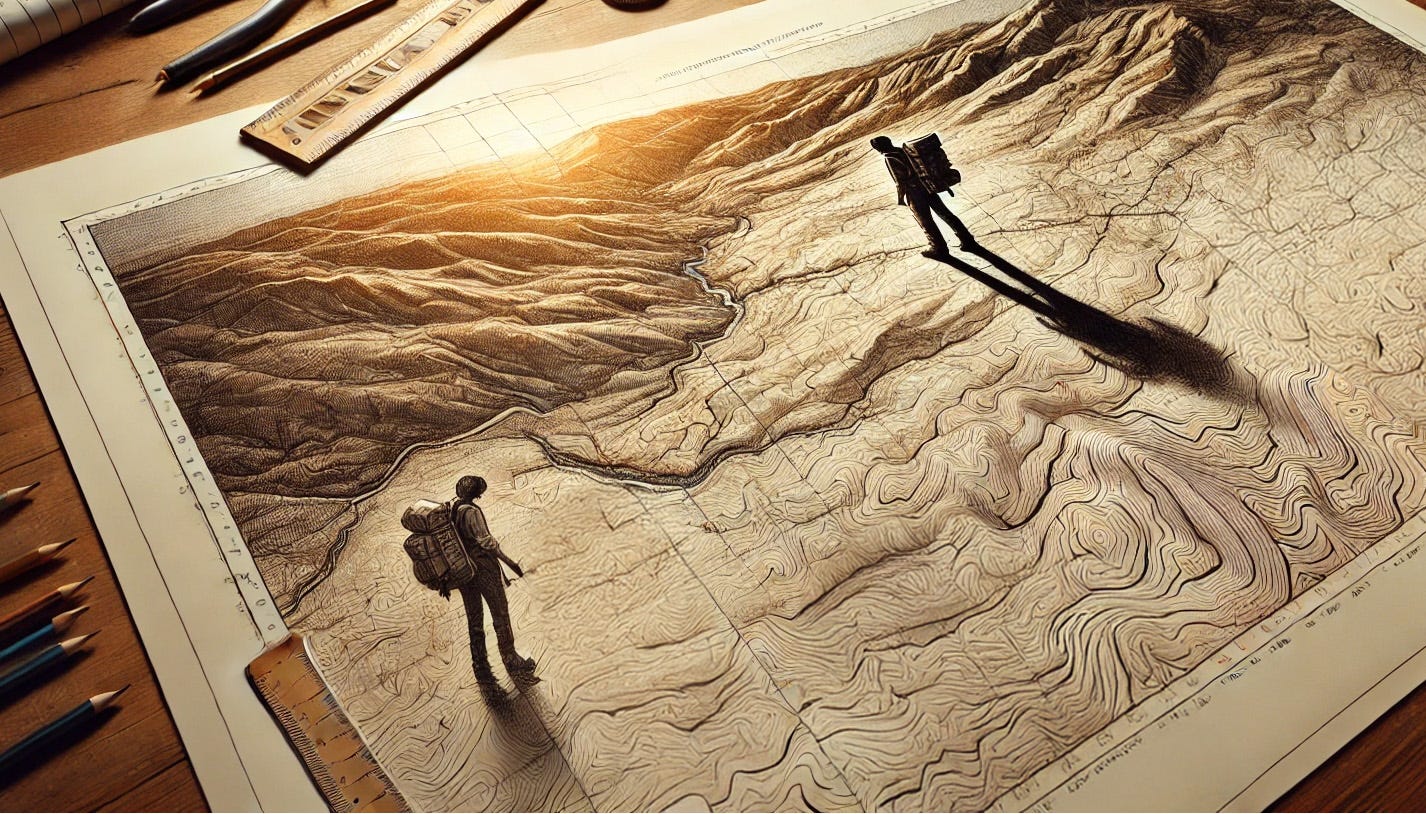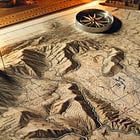Previous post in this series:
Next post:
In last week’s post, we looked at what is involved in doing fieldwork on your own. We looked at the challenges and opportunities, and how best to manage your process to get the most out of it.
Much of what we covered remains relevant in today’s post about working with a partner, specifically with respect to the experience of the explorer being facilitated. So most of what I present below focuses on the role of facilitation. Facilitating fieldwork requires a slightly different stance than does ordinary conversation, counseling, or therapy, so we will describe those differences and how best to occupy this new role.
At this early stage of our exploration, it makes sense for us to focus on a few basics. Later, after we have had plenty of opportunity to see more of what we’re getting into, we will go more deeply into the facilitation process. All we’re doing right now is to begin making our observations using fieldwork mapping.
Sharing the Mapping Experience
The experience of fieldwork can seem odd at first. Most of us have never engaged with explicit questions about what a feeling actually feels like, so giving a feeling state this much attention is unusual in itself. More often, we’re familiar with talking at length about what we think, remember, believe, perceive, or do when we feel a certain way, but almost never does anyone ask what it actually feels like. And to be honest, we’ve never had many good ways to answer such a question.
Because of this, sharing the mapping experience with someone can be quite special. The mapping questions allow you to share more of the reality of your inner experience than is common, and it can be nice just to have someone be a witness to that awareness. On the other side of the relationship, being a witness feels like a special privilege, like being welcomed into a private sanctuary.
If you do choose to invite someone to share this work with you, consider entering into a mutual facilitation partnership. As the facilitator, you are taking responsibility for holding the structure of the process, supporting your explorer partner in surrendering more fully into the mapping experience. As the explorer, you get to lean into that support from your facilitator partner and place your full focus on your own inner experience. Here are some things I encourage you to take into consideration involving these two roles.
Holding the Facilitator Role
In fieldwork, the facilitator is a guide, a holder of the safe space, and an anchor for the process of self-exploration. As the facilitator, you put aside the functions of advice, empathy, commentary, analysis, and other activities often found in the roles of counselor or friend. Through asking the fieldwork question sequence and taking on the task of recording notes, you simply support the explorer’s own self awareness and discovery.
The facilitator’s job is to control the entrance and exit to this practice space, being clear about beginning, maintaining and completing the work. Outside of fieldwork, you are free to pick up other activities again, moving back into the space of friend, partner, or other relationship.
If you are in a close relationship with your fieldwork partner, don’t assume you can enter the role of facilitator at any time. At all times, the practice is ultimately managed by the explorer. Of course, this should always be the case in doing fieldwork, even in a professional therapy setting.
Another important function of the facilitator is that of focused attention. The facilitator puts self aside during fieldwork and focuses all attention on the explorer. As the facilitator, strive to honor and mirror the explorer's experience, and to assist the explorer in gaining clarity and awareness about that experience. Your job is to enter their world with your awareness and presence only, not to bring your own world into theirs.
Although these requirements of clarity and focus may seem to imply that a facilitator must have advanced training to be effective, that is not the case. These qualities are well represented in the structure of the fieldwork questioning sequence (to be covered in the next post). Even a beginning facilitator can assist an explorer in coming to a much deeper self awareness simply by reading the questions aloud.
As a facilitator, be mindful that you occupy a privileged role. The experience of self discovery through fieldwork is ultimately uplifting and affirming of the deepest goodness of a person’s being. At the same time, part of the journey can involve encountering very vulnerable spaces within oneself. The explorer is choosing to share that with you. It is one of the most special gifts you can receive from anyone.
Privileges of the Fieldwork Facilitator Role
One of the most satisfying benefits of fieldwork is the relationship it enables between a facilitator and their explorer. Here are a couple of unique aspects of the fieldwork experience.
First, because fieldwork supports clear and detailed revelation of the explorer’s inner world of feeling, the facilitator gets to more fully witness another’s interior. The experience is one of being on a journey into a foreign land, while at the same time being fully conversant in the language.
Second, because the facilitator role is more of a pure facilitation, the facilitator is less likely to take on emotional energies from the work. Facilitating is experienced as clean and relatively easy, supporting the facilitator in keeping clear boundaries for their own life energy.
Suggestions for Facilitation Success
The following tips and tactics should support you in having the most satisfying experience of facilitating, and your explorer in having the most satisfying experience of exploring.
Capturing Exact Words
When you are facilitating someone’s fieldwork journey, you will serve them best by taking detailed, accurate notes. Here’s why.
You are a visitor in someone else’s world. The language they use to refer to their world is theirs and theirs alone. Treat their words as priceless, sacred gems. Your role is to support their journey through a land open only to them. They offer you their words to give themselves handles to help them on that journey. If you rephrase what they say, or bring your own way of articulating things into the process, you lose that vital connection to the territory inside of them. They’ll feel it. They won’t feel as well supported.
When you use the explorer’s own words and phrases to point to vital portions of their world, they feel you beside them. They experience your support and guidance. They benefit from having their private, unique world held so graciously and gently by you. Holding their world with this kind of fierce respect enables them to travel more securely from place to place, to conduct their inquiry, to make their way into nebulous spaces and back out again.
One more thing. You do not need to “understand” what their words mean. Most of the time, you can do an excellent facilitation job simply using their language in your facilitation, supporting their inquiry, without really needing to know exactly what they mean by this or that word or phrase.
This is especially true with regard to feeling state names. Even, for example, if their first (or favorite) language is different from your own, if they name a feeling state in a language foreign to you, ask for the best way to spell it, capture it in the notes as they specify, try to match their pronunciation when you refer to the state, and you’re good to go.
Again, keep in mind, your facilitator role is not about you. Do not take up space making sure you understand everything they are talking about. It is as if you are a proxy for their own selves, and make sure you capture exactly what you need, no more or no less, to do that job well. Do only what you need to in order to offer steady, reliable facilitation.
Supporting Explorers Different From Yourself
Perhaps you will have done fieldwork, either solo or under someone’s facilitation, before taking on the facilitation role yourself. So you’ll have a point of reference in your own experience that you’ll want to refer to when guiding others. But be a little careful with that.
From time to time you will encounter explorers with very different experience than your own. Keep coming back to the fundamental principles of fieldwork facilitation. You are here to serve their journey and to support their experiences, whatever those might be. Let me give you a few examples of what you might encounter.
Some people might have very different typical feeling state maps from your own, varying in structure, size, location, and other possibilities.
Some people might work much more quickly or slowly than you, with some people able to whiz through mapping so fast it makes your head spin while others need to walk at a very slow pace as they feel their way through the landscape.
Some people might have a much more intuitive flow to their process and not be as well served by relying on the systematic structure to such a high degree.
For some people, their imagination might be very active and involved, and you’ll want to engage that, to wrap it into the basic fieldwork process to serve them best.
In all these cases and more, again, you’ll want to rely on the basic structure of the process, to keep your facilitator role as pure as possible, to enter their world as fully as you can, and to maintain your own sense of wonder at the differences among us. Good luck!
Your job as a fieldwork facilitator is simply to support your explorer’s self-discovery. You won’t be interpreting their experience. You won’t be directing their explorations. You won’t be taking on any role beyond that of a simple witness and facilitator of their attention on their own experience. When you’re finished, it’s relatively easy to take the facilitator hat off and return to whatever relationship you already have.
In fact, because this work highlights gifts and capacities we all have, people generally find their connections grow closer as a result of sharing this work. Fieldwork goes beyond the surface stories that keep us trapped and gets to the deeper truth of feeling that connects us all.
Maintaining Clear Role Boundaries
Because the structure of fieldwork is straightforward, and because the explorer is fully in charge of their own journey, it is possible for people having various other types of relationship to support one another with fieldwork facilitation. As with any human engagement, there is room for power struggles, manipulation, and other games, but fieldwork constrains the likelihood of these showing up with any force.
In fieldwork, you are either in the facilitator role or the explorer role. You are not crossing between them, and you are not inhabiting your ordinary, everyday life role. No matter who you are to one another, you can support your work together by making sure you set clear boundaries.
First, set a boundary between the fieldwork and the rest of your life. Set a clear time to start. If possible, use the same physical or virtual space each time and avoid using that space together for anything else. Do whatever works to help you enter the fieldwork space when it is time to begin and step out of it when you are through.
Then, set a boundary between the hat you wear outside the session and inside it. When you are taking the role of facilitator, do what you need to transition cleanly between who you are outside of your session and your facilitator role inside of it. Your role is to be completely of service. Your facilitation is not about you. Your own needs must be handled before and after, and not swirled into the session itself.
When you are taking the role of explorer, it is all about you. Let go of whatever you might be holding about the person who is stepping into the role of facilitator, good or bad, and place that outside the space entirely. The person holding the role of facilitator for you is there entirely for you, ready to serve your journey and nothing else.
Make sure to have an agreement about the time you will spend. Renegotiate that agreement when necessary. For example, set an end time plus or minus fifteen minutes, and make the decision about when to end depending on what is showing up just before then. Give yourselves time to complete whatever you’re in the midst of before wrapping up.
Finding Balance in the Explorer Role
As the explorer in a mutual facilitation partnership, you’ve got the best of both worlds. You’ll be fully free to “pop out” into a more witness position to manage your own journey, on the one hand. But you’ll also be able to fully surrender into being held by your facilitator partner.
It can be tempting to prioritize one of these modes over the other. You might find yourself tending to give up your own agency and lean into your facilitator for all decisions about how to proceed. Or you might zealously want to make your own choices about where you want to go next, and how. Try to find a gentle balance between these two. Both sides have something to offer, neither is wrong, and I encourage you to pay attention to what works best for you as you learn more about the practice.
Note: This is not therapy, not at this point.
Whether you choose to engage as a solo explorer or enter into a mutual facilitation partnership with a fellow explorer, it’s important to enter with eyes wide open. At this point in what I have presented and in what you will be able to undertake, we should be thinking about our explorations as just that: explorations. No more, no less.
Our goal is to explore, to observe, to conduct our studies. We want to discover more about this new territory that has been revealed to us, to develop and apply new maps, to learn to navigate with ease and mastery. And we want to optimize our ability to do so with discipline and rigor.
At this point in the development of our science, we do not yet have the basis for conducting something that fits the standards of therapy. While we might find our explorations beneficial in some ways, we should not be engaging for therapeutic purposes. Instead, whether we choose to enter a facilitation partnership or go solo, this work should serve the purposes of our curiosity and desire to learn more about this mysterious realm within ourselves.
Moreover, at this point in your fieldwork journey, I recommend that you concentrate on the basics. We are building skills for using fieldwork to map various feeling states, turning our attention inward toward feelingmind and capturing our observations of virtual material properties of affect fields. This is all we will need for building the foundations of our science together — to start getting the lay of the land, so to speak. We will use our instrument of observation to observe what we are able to observe, and build from there.
A Reminder to Take Things Slowly
I’ve covered a lot of ground in this post, as it was difficult not to reach into the future of what you have to look forward to in doing fieldwork. At the same time, there is a lot I haven’t covered yet. As you will see soon enough, the territory inside of us all is profoundly expansive, elegantly interwoven, and overflowing with meaning and significance. Entering this realm by applying the power of fieldwork leads very quickly into possibilities for personal and universal discovery that go beyond what you are likely to be able to imagine at the outset. You will at some point find yourself simultaneously overwhelmed and in awe.
So. There is no hurry. You will be best served by taking small bites, nibbling here and there to learn your way around. Take it slow. Take it small. And give yourself as much luxury of time and nurturing for yourself as you possibly can.
Reflections
In the course of this series on fieldwork mapping, I would like to ask for your feedback about how well you are able to put these instructions to work. Where do you struggle, what comes easily, and what suggestions do you have for improving how this series supports you and others in doing the mapping? Thank you!
And of course, if you have not yet subscribed and would like make sure to keep up with this series and beyond, please do subscribe. Consider signing up for a paid subscription to participate in the live Engage meetings, where you’ll be able to get your questions answered and more.





The power of small steps! Yes!! Very good and clear descriptions of the facilitator explorer roles and relationships 🙏